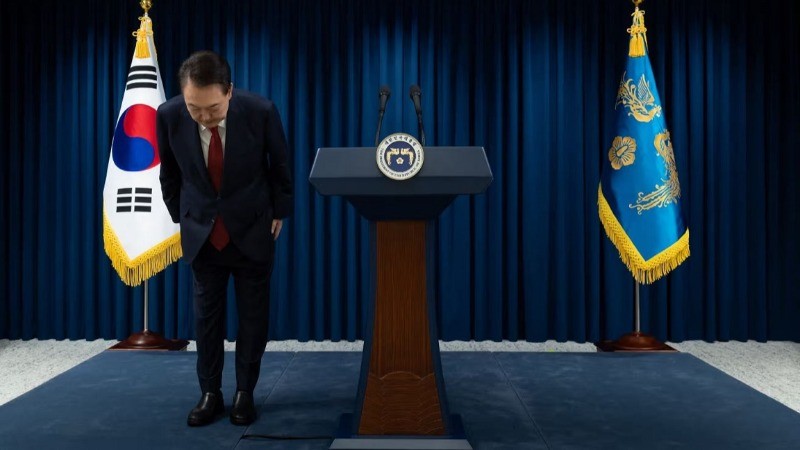
South Korean President Yoon Suk-yeol has apologized for declaring emergency martial law on Tuesday night, which was lifted just six hours later amid protests from citizens and lawmakers. In his first public address since the emergency order was rescinded, Yoon said that he would leave all decisions, including his position as president, to his ruling People Power Party (PPP) in an effort to stabilize the nation.
The apology was made through a televised speech on Saturday morning. Yoon explained that the martial law declaration was made due to his sense of urgency as the nation's leader, feeling responsible for the country's political situation. He expressed regret for causing public concern and inconvenience and stated that he takes full legal and political responsibility for the decision. He also pledged that such a measure would not be imposed again.
Yoon emphasized that it was now up to his party to determine the best course of action for the political situation, including decisions regarding his leadership.
In response, PPP leader Han Dong-hoon suggested that an early resignation might be necessary, as he felt the president was no longer in a position to carry out his duties. Han stated that discussions would take place with the prime minister and the party to address crucial issues affecting the people's lives.
Meanwhile, Lee Jae-myung, leader of the Democratic Party, criticized Yoon's apology as inadequate. He called for Yoon's immediate resignation or impeachment, stating that the president posed the greatest risk to the country.
Public reaction in Seoul has been largely critical of Yoon’s speech. Some citizens expressed doubts about whether his apology was genuine, while others, including rally participants demanding Yoon's resignation, felt his apology was insincere and insufficient. They believe a true apology would involve Yoon stepping down from his position.
Victor Cha, a former senior White House official now serving as Korea Chair at the Center for Strategic and International Studies, commented on the situation in Washington. He suggested that Yoon’s apology was an attempt to address his rash decision but noted the country’s current political instability. Cha also highlighted the growing ties between North Korea, China, and Russia, with North Korea’s recent military actions underscoring this development.
Regarding the U.S. response, Cha mentioned that while Washington was surprised by the martial law declaration, it was now closely monitoring the situation. He added that the U.S. was not taking sides in the domestic political conflict, instead focusing on a peaceful resolution.
The ruling party lawmakers are scheduled to meet to finalize their stance ahead of an impeachment vote on Saturday afternoon. Opposition parties, including the Democratic Party, have submitted a motion for Yoon’s impeachment, which could pass if two-thirds of the National Assembly votes in favor, including at least eight members of the ruling party.
Yoon’s Presidency Struggles with Scandals Involving His Wife Kim Keon Hee
South Korean President Yoon Suk-yeol's time in office has been marked by a series of policy missteps, economic challenges, and controversial appointments. However, the scandals surrounding his wife, Kim Keon Hee, have become his biggest political headache.
Kim has been at the center of multiple allegations, including stock price manipulation, improper involvement in party candidate nominations, and accepting a luxury Dior bag worth 3 million won (£1,675) as a gift from a pastor. These scandals have put a significant strain on Yoon's presidency.
In response, Yoon has blocked three bills proposing the creation of a special counsel to investigate his wife. This has fueled opposition lawmakers' calls for his impeachment, citing his attempts to protect his family from investigation.
A fourth attempt to establish a special counsel to probe Kim is expected to be voted on just before the impeachment motion. This timing seems to be aimed at ensuring ruling party lawmakers participate in both votes, preventing them from avoiding the crucial impeachment vote by staying absent.
The ongoing political turmoil has sparked widespread protests across South Korea. On Friday night, large-scale demonstrations took place, and more are scheduled for Saturday. Labour unions and civic groups have organized a major candlelight march near the National Assembly. Additionally, Korean communities in London, Paris, and Berlin are holding their own protests, demanding that President Yoon step down.